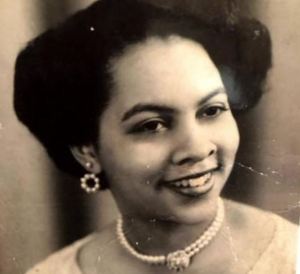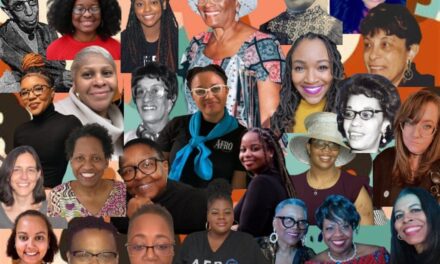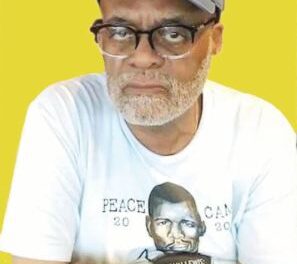By Alexis Taylor
Special to the AFRO
Alice Theresa Baysmore Manns didn’t have to know you. You didn’t have to be family. You didn’t even have to have the money to pay- if a Black person passed away in Baltimore, there was a Black person that needed to be buried. And she got to work.
One of the few examples of what a Black funeral directress in America could be, Manns restored dignity and respect to a Black Baltimore tormented by Jim Crow- even in death.
After decades of service, Manns took her last breath at the age of 87 on January 29, 2022.
“She gave everything of herself. She loved the community, her family, her spirituality and her profession,” said Sharon Elizabeth Manns Floyd, a close niece, recalled. “She was a mentor to all of us before we even realized what a mentor really was. It was the way that she lived her life. She was serious about family and community.”
Floyd said she can recall being at Mann’s side as she ran the family business with the utmost sense of professionalism, compassion and empathy.
“I got to see her when she was a funeral directress, when she was in front of the families of the bereaved and behind the scenes. I got to see her operate every stage of the business and she was so extremely professional in every single manner,” said Floyd. “I understood the value of going into a profession and giving it everything you got- you live it and you breathe it.”
The Robert A. Elliott Funeral Home rose to prominence in a time where options for Black funerals and Black burials were limited. The same laws that regulated where Black people could eat, sit, work and play also controlled where they went when they got sick and where they rested when they died.
“There were very few funeral homes and very few places where African Americans could be buried. My grandparents and Aunt Alice often took in people who were not able to pay for their funerals,” said Floyd. “That was the largest impediment in our community- a lot of people couldn’t afford the funeral, the casket and everything that entails.”
Manns was recognized as the longest-living African-American woman mortician in Baltimore City by the National Funeral Directors and Morticians Association Inc. and the Black Funeral Directors and Mortician Association in 2020.

She was the last female director of the family business, which began with the licensure of Robert A. Elliot in 1902, but she wasn’t the first.
“Her mother was a funeral director and her grandmother was a funeral director before her,” said Carlton C. Douglass, past president of National Funeral Directors and Morticians Association Inc. “After Robert A. Elliot passed away, the business was always run by a woman. Mrs. Manns was the last of the women to operate what became Elickson Funeral Home.”
She was named after her grandmother and a fifth generation operator of the business.
Douglass, who has assisted with funeral arrangements for the likes of Duke Ellington and Aretha Franklin, said Manns leaves behind a strong legacy in a business that rarely produced female titans.
“There weren’t a lot of women in the funeral business in the 30s, 40s, and 50s,” he said. “Baltimore has a history of dynamic women in this business. There was a plethora of women in this city who had vibrant funeral businesses compared to women around the country, women like Helen Holland and Katie Williams.”
Dr. Hari P. Close, current president of the National Funeral Directors and Morticians Association, Inc., said that Manns was “able to inspire the next generation” of funeral directors who would use their revenue to serve and silently take their place fighting on the frontlines for freedom.
“We were the financiers of the Civil Rights Movement,” said Close. “We were the underground railroad of the modern day. It was a funeral home that took people like Dr. King and Rev. Abernathy from city to city and state to state because they never stopped a moving hearse.”
“We are so low-key about what we do in our communities, but people like Alice inspire us to tell our story.”
Close said in the Black community, the Elliots and other funeral directors quietly operated as a welfare system to keep their communities afloat.
“They were the welfare system when the welfare system did not provide,” he said. “The Elliots provided so much to the community. When people couldn’t pay their rent and the lights were going off- it was the Elliot’s that helped and they never took recognition for it.”
According to her obituary, Manns is preceded in death by her husband, “Charles Henry Manns, Jr.; son, John Anthony Manns; grandson, Michael Bradley Jackson; sister, Charmaine Elizabeth Bennett; and brother Robert E. Baysmore, Sr.”
“Manns leaves behind, her children, Charles Henry Manns III (Terena), Ingrid Angela Jackson nee Manns (Maurice), Eric Edward Manns Sr. (Audrey), Renata Theresa Henderson, nee Manns (Ralph); grandchildren William Dell Jackson (Patricia), Erica Mia Manns, Tiffani Erica Manns, Lauren Ashley Henderson, Eric Edward Manns, Jr., Joshua Emmanuel Henderson, Ashley Kristian Manns, Shartae Arnise Lawson, Dominic Donnae Watkins, and James Lewis King III; great-grandchildren, Ethan Matthew Jackson, Christopher Jeremiah Henderson, Franklin Jay Smith Jr., Royal Lynne Henderson, Kennedy Madison Jackson, Aubrey Gabrielle Cromwell, Mahari Jordyn Henderson; sisters, Ida Elizabeth Miller, Zorah Betty Logan (Curtis), and brother Joseph J. Baysmore, and a host of nieces and nephews, cousins, relatives and friends.”
Help us Continue to tell OUR Story and join the AFRO family as a member – subscribers are now members! Join here!
The post First and Few: Baltimore’s Longest Living Funeral Directress Passes Away appeared first on AFRO American Newspapers .











